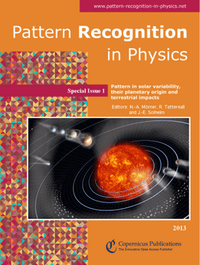Pattern Recognition in Physics
Pattern Recognition in Physics was an open-access journal originally published by Copernicus Publications which was established in March 2013 and terminated in January 2014. The editors-in-chief were Sid-Ali Ouadfeul (Algerian Petroleum Institute) and Nils-Axel Mörner, the latter of whom is a well-known global warming skeptic.[1] Copernicus ceased its publication due to concerns over the publication's views towards the scientific consensus of global climate change and the method of peer review. In March 2014 Ouadfeul reopened the journal, "run on private founding" [sic].[2]
 | |
| Discipline | Physics |
|---|---|
| Language | English |
| Edited by | Sid-Ali Ouadfeul |
| Publication details | |
| History | 2013-2014 |
| Publisher | |
| Yes | |
| Standard abbreviations | |
| ISO 4 | Pattern Recognit. Phys. |
| Indexing | |
| ISSN | 2195-9250 |
| OCLC no. | 858879687 |
History
Copernicus agreed to publish the journal because the editors claimed that its aim would be "to publish articles about patterns recognized in the full spectrum of physical disciplines rather than to focus on climate-research-related topics."[3] Concerns regarding the journal's peer-review process were first raised in July 2013 by Jeffrey Beall, an American librarian and critic of predatory open access publishing. Beall wrote on his blog that Mörner did not appear to be a specialist in pattern recognition and that Ouadfeul's research had "only been cited a couple times." He also noted that two of the journal's first five articles were authored by Ouadfeul himself, and concluded that "This is not a good start for a journal, and the publisher ought to be concerned and take action."[4]
After a special issue of the journal was published in December 2013, which contained a paper in which the authors said they "doubt the continued, even accelerated, warming as claimed by the IPCC project,"[5] Copernicus managing director Martin Rasmussen expressed concern regarding this journal. He also said that "the editors selected the referees on a nepotistic basis, which we regard as malpractice in scientific publishing."[3] On January 17, 2014, Copernicus Publications announced that they were terminating the journal, citing both the statement that questioned the IPCC's prediction of continued global warming and the "nepotistic" appointing of similarly-minded scientists to the journal's editorial board.[6]
References
- Castelvecchi, Davide (20 January 2014). "Climate comments push open-access publisher to terminate journal". Nature News Blog. Retrieved 11 February 2014.
- "Pattern Recognition in Physics". March 2014. Archived from the original on 2014-03-14. Cite journal requires
|journal=(help) - Stokstad, Erik (17 January 2014). "Alleging 'Malpractice' With Climate Skeptic Papers, Publisher Kills Journal". Science Insider. Retrieved 11 February 2014.
- Beall, Jeffrey (16 July 2013). "Recognizing a Pattern of Problems in "Pattern Recognition in Physics"". Scholarlyoa.com. Archived from the original on 22 February 2014. Retrieved 11 February 2014.
- Mörner, Nils-Axel (December 2013). "General conclusions regarding the planetary–solar–terrestrial interaction" (PDF). Pattern Recognition in Physics. 1 (1): 205–206. doi:10.5194/prp-1-205-2013.
- Adler, Jonathan H. (20 January 2014). "Was a scientific journal canned for disagreeing with the IPCC?". The Washington Post. Retrieved 11 February 2014.